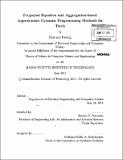Projected equation and aggregation-based approximate dynamic programming methods for Tetris
Author(s)
Hwang, Daw-sen
DownloadFull printable version (4.429Mb)
Alternative title
Approximate dynamic programming : projected equation and aggregation methods for Tetris
Other Contributors
Massachusetts Institute of Technology. Dept. of Electrical Engineering and Computer Science.
Advisor
Dimitri P. Bertsekas.
Terms of use
Metadata
Show full item recordAbstract
In this thesis, we survey approximate dynamic programming (ADP) methods and test the methods with the game of Tetris. We focus on ADP methods where the cost-to- go function J is approximated with [phi]r, where [phi] is some matrix and r is a vector with relatively low dimension. There are two major categories of methods: projected equation methods and aggregation methods. In projected equation methods, the cost-to-go function approximation [phi]r is updated by simulation using one of several policy-updated algorithms such as LSTD([lambda]) [BB96], and LSPE(A) [B196]. Projected equation methods generally may not converge. We define a pseudometric of policies and view the oscillations of policies in Tetris. Aggregation methods are based on a model approximation approach. The original problem is reduced to an aggregate problem with significantly fewer states. The weight vector r is the cost-to-go function of the aggregate problem and [phi] is the matrix of aggregation probabilities. In aggregation methods, the vector r converges to the optimal cost-to-go function of the aggregate problem. In this thesis, we implement aggregation methods for Tetris, and compare the performance of projected equation methods and aggregation methods.
Description
Thesis (S.M.)--Massachusetts Institute of Technology, Dept. of Electrical Engineering and Computer Science, 2011. Cataloged from PDF version of thesis. Includes bibliographical references (p. 65-67).
Date issued
2011Department
Massachusetts Institute of Technology. Department of Electrical Engineering and Computer SciencePublisher
Massachusetts Institute of Technology
Keywords
Electrical Engineering and Computer Science.